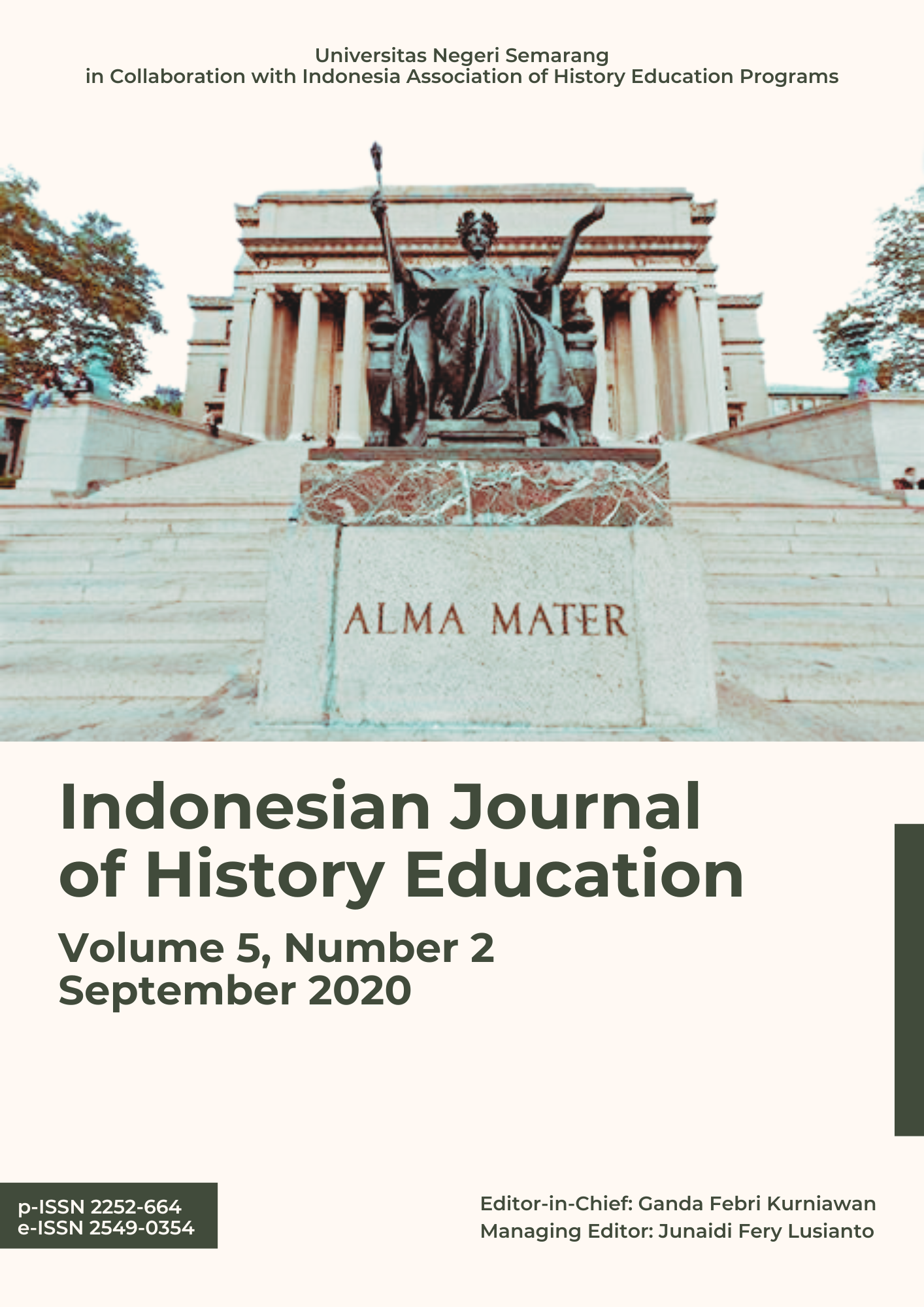Implementation of Nationalism Values in Learning the History of Independence Organizations in Class XI IPS 1 SMA Nasional Nusaputera Semarang
Abstract
The purpose of this study is: (1) How is the implementation of the values of nationalism in the study of history on the subject of independent organizations in a class of XI IPS I in Nusaputera National High School of Semarang? (2) What constraints are experienced by teachers when applying the values of nationalism in the process of learning the history of the subject of independence organizations in class XI IPS I in Nusaputera National High School of Semarang? (3) What efforts are made by teachers to overcome obstacles when applying the values of nationalism in the process of learning the history of the subject of independence organization in class XI IPS I in Nusaputera National High School of Semarang? This research is a descriptive qualitative research. The results showed that the implementation of the value of nationalism in learning history on the subject of independence organizations in the class XI IPS I National Senior High School Nusaputera Semarang has been running well. The value of nationalism implemented was from planning, execution, and evaluation, including religion, pride to be Indonesian, love of homeland and nation, discipline, and appreciation of the service of former heroes. Obstacles experienced by teachers are learning, moral decline, electronic media, and time constraints. Efforts made by teachers are continuously giving the delivery of the value of nationalism
References
Budiwibowo, S. (2016). Membangun pendidikan karakter generasi muda melalui budaya kearifan lokal di era global. Premiere Educandum: Jurnal Pendidikan Dasar Dan Pembelajaran, 3(01).
Dahlan, M. M., Ratmanto, A., Novianti, A., Rochman, A., Winda, D. A., Prasetya, H. E., & Priyono, Y. (2009). Gelaran Almanak Seni Rupa Jogja 1999-2009. I: BOEKOE & Gelaran Budaya.
Hamdi, A. S., & Bahruddin, E. (2015). Metode penelitian kuantitatif aplikasi dalam pendidikan. Deepublish.
Hos, H. J., & Ambo Upe, S. S. (2018). Pergaulan bebas di kalangan pelajar (studi kasus di desa masaloka kecamatan kepulauan masaloka raya kabupaten bomabana) (Doctoral dissertation, Haluoleo University).
Kutoyo, S. (1997). Sejarah Daerah Daerah Istimewa Yogyakarta. Direktorat Jenderal Kebudayaan.
Moleong, L. J. (2007). Metodologi penelitian kualitatif edisi revisi. Bandung: Remaja Rosda Karya.
Muhammad, J., Pambudi, A., & Subarkah, K. (2015). Analisis Dampak Sosial dan Ekonomidalam Pembangunan Flyover Jombor di Kabupaten Sleman. Pelita-Jurnal Penelitian Mahasiswa UNY, (1).
Mukarrom, A. (2014). Sejarah Islam Indonesia I. UIN Sunan Ampel.
Mulyadi, M. (2012). Riset desain dalam metodologi penelitian. Jurnal Studi Komunikasi Dan Media, 16(1), 71-80.
Mulyana, A. (2013). Nasionalisme dan militerisme: Ideologisasi historiografi buku teks pelajaran sejarah SMA. Paramita: Historical Studies Journal, 23(1).
Nihayah, S., & Adi, A. S. (2014). Penanaman nasionalisme pada siswa madrasah aliyah negeri 1 bojonegoro di tengah arus globalisasi. Kajian Moral Dan Kewarganegaraan, 2(3), 829-845.
Nilamsari, N. (2014). Memahami studi dokumen dalam penelitian kualitatif. WACANA: Jurnal Ilmiah Ilmu Komunikasi, 13(2), 177-181.
Nugroho, U. (2018). Metodologi penelitian kuantitatif pendidikan jasmani. Penerbit CV. Sarnu Untung.
Octaviani, R., & Sutriani, E. (2019). Analisis data dan pengecekan keabsahan data, Sekolah Tinggi Agama Islam Negeri (Stain) Sorong.
Putra, I. P. A. S., Sinarwati, N. K., & Wahyuni, M. A. (2017). Akuntabilitas dan transparansi pengelolaan alokasi dana desa (ADD) di Desa Bubunan, Kecamatan Seririt, Kabupaten Buleleng. JIMAT (Jurnal Ilmiah Mahasiswa Akuntansi) Undiksha, 8(2).
Rijali, A. (2018). Analisis data kualitatif. Alhadharah: Jurnal Ilmu Dakwah, 17(33), 81-95.
Riswanto, D. (2019). Penguatan Nilai-Nilai Pancasila Dan Kebangsaan Kepada Peserta Didik Pada Layanan Bimbingan Dan Konseling Di Sekolah. Jurnal Civic Education: Media Kajian Pancasila dan Kewarganegaraan, 3(1), 13-19.
Septiana, R. (2016). Peranan Ekstrakurikuler Kesenian Tradisional Dalam Membangun Sikap Nasionalisme Siswa. Jurnal Civicus, 16(2), 99-109.
Soendari, T. (2012). Pengujian keabsahan data penelitian kualitatif. Bandung: Jurusan PLB Fakulitas Ilmu PendidikanUniversitas Pendidikan Indonesia.
Soewarso. (2000). Cara-cara Penyampaian Pendidikan Sejarah Untuk Membangkitkan Minat Peserta Didik Mempelajari Sejarah Bangsanya. Jakarta: Depdiknas.
Sudrajat, A. (2010). Pengembangan Karakter. Diakses pada tanggal 01 Februari 2017 jam 12.30 WIB. http://akhmadsudrajat.wordpress.com/2010/ 12/26/pengembangankarakter/.
Tanujaya, C. (2017). Perancangan Standart Operational Procedure Produksi Pada Perusahaan Coffeein. Jurnal Performa: Jurnal Manajemen dan Start-up Bisnis, 2(1), 90-95.
Widiyaningrum, W. Y. (2019). Menumbuhkan nilai kesadaran Pancasila di kalangan generasi muda: Kajian teoritis. JISIPOL| Jurnal Ilmu Sosial dan Ilmu Politik, 3(3), 69-78.
Widja, I. G. (1989). Dasar-dasar pengembangan strategi serta metode pengajaran sejarah. Jakarta: Depdikbud.
Copyright (c) 2020 Indonesian Journal of History Education

This work is licensed under a Creative Commons Attribution 4.0 International License.
Copyright Notice
An author who publishes in the Jurnal Indonesian Journal of History Education agrees to the following terms:
- Author retains the copyright and grants the journal the right of first publication of the work simultaneously licensed under the Creative Commons Attribution-ShareAlike 4.0 License that allows others to share the work with an acknowledgement of the work's authorship and initial publication in this journal
- Author is able to enter into separate, additional contractual arrangements for the non-exclusive distribution of the journal's published version of the work (e.g., post it to an institutional repository or publish it in a book) with the acknowledgement of its initial publication in this journal.
- Author is permitted and encouraged to post his/her work online (e.g., in institutional repositories or on their website) prior to and during the submission process, as it can lead to productive exchanges, as well as earlier and greater citation of the published work (See The Effect of Open Access).
Read more about the Creative Commons Attribution-ShareAlike 4.0 Licence here: https://creativecommons.org/licenses/by-sa/4.0/.




